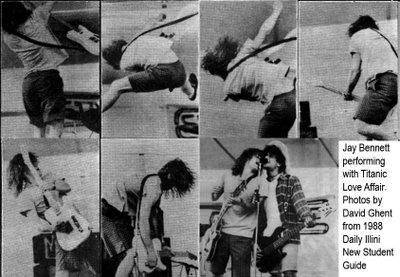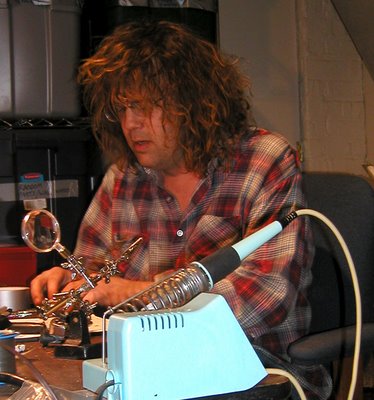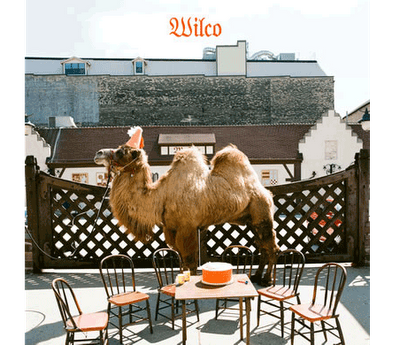I happened to be in Champaign-Urbana this weekend when a sad news story broke: the death of Jay Bennett, a remarkably talented musician I had interviewed several times over the past eight years. Bennett was best known for his role as lead guitarist, keyboardist, all-around studio whiz and occasional songwriter in Wilco, making an indelible mark on much of the band’s best records, including Yankee Hotel Foxtrot and Summerteeth. He also recorded several solo records and one in collaboration with Edward Burch, the excellent The Palace at 4am (Part I).
 But I first encountered Bennett back in the 1980s, when he was the lively guitarist for Titanic Love Affair, a hard-rock band on the University of Illinois campus. Here are some photos by David Ghent showing him in action, which I ran when I was an editor at the Daily Illini in 1988. Bennett’s fluid guitar playing impressed me at the time, and I was already hearing that he was talented at recording music.
But I first encountered Bennett back in the 1980s, when he was the lively guitarist for Titanic Love Affair, a hard-rock band on the University of Illinois campus. Here are some photos by David Ghent showing him in action, which I ran when I was an editor at the Daily Illini in 1988. Bennett’s fluid guitar playing impressed me at the time, and I was already hearing that he was talented at recording music.
In June 2001, when Wilco was finishing up Yankee Hotel Foxtrot, I interviewed him for the first time. We sat on the back porch of his house in Arlington Heights, Illinois, with birds singing in the background. Click here for an extended version of the article I wrote, including a Q&A. I had no inkling that Jeff Tweedy would ask Bennett to leave the band a few months later, but that is in fact what happened. I was stunned at the time. Bennett had contributed so much to Wilco’s music, it seemed impossible he would be fired. You can read all about what happened from multiple angles in Greg Kot’s book Learning How to Die. I later came to realize that Bennett was a genius whose obsessive work habits might just drive some people a little crazy. But I never lost faith in his musical abilities.
At that first interview, I was struck by how much Bennett seemed like a combination of rock-star dude, philosophical intellectual and VCR repairman. In April 2002, as Bennett and Burch released Palace, I interviewed him again. The Q&A is so long it’s in two parts: Part 1 is mostly about The Palace at 4am (Part I). Part 2 is mostly about Bennett leaving Wilco.
 A year after that, I spent a couple of hours at Bennett’s recording studio in Chicago, focusing more on his production techniques and gear for a story in Tape Op magazine.
A year after that, I spent a couple of hours at Bennett’s recording studio in Chicago, focusing more on his production techniques and gear for a story in Tape Op magazine.
I’m posting a 13-minute podcast here with selections from those three interviews. What you hear is a few minutes of Jay talking in 2001 about collaborating with Tweedy in Wilco; Jay explaining what happened when he left the band; Jay in his Pieholden Suite studio, where the great young musician David Vandervelde was hanging out at the time; and then some additional thoughts from that 2002 interview. Click here to download my podcast featuring Jay Bennett in his own words. (My apologies for the spotty audio quality in some segments.)
The last time I wrote about Bennett was at the end of 2004, when he was releasing a solo album called The Beloved Enemy. He had also seemed upbeat whenever I’d interviewed him, but lately, I’d been hearing alarming reports that he seemed depressed or intoxicated at some live performances. One fan was concerned enough to post a question on the message board of Bennett’s record label, Undertow Music: “Is Jay OK? Seriously.”
“The answer to ‘Am I OK?’ is a resounding ‘Yes,'” Bennett said when I asked him about this. “I am going through a divorce. … I certainly had my issues with drinking.” He also acknowledged having used drugs, though he said he didn’t currently have a problem with substance abuse.
“Most of my adult life, I’ve been a drinker. And I’ve dabbled in everything else that most rockers have done. Was it to the point that it interfered with my life? I don’t think so,” he said. “I’ve had my share of rock ‘n’ roll excess, where it was impeding my judgment here and there … I had friends express concern about me. At various times in my life, I was self-medicating. I have an anxiety disorder. I’ve been though seven therapists in five or six years. I’ve finally found one who clicks. It works.”
When he first answered his phone that time, Bennett was in the middle of a therapy session. He said he also viewed his latest records as a kind of therapy. “This record is a way to get rid of some of that pain by expressing it,” he said. “Drugs and alcohol were a way to deal with that same pain.”
Bennett, who had moved to Urbana, made news just a few weeks ago when he filed a lawsuit seeking royalties from Wilco. He’d also posted a note on myspace saying he was in need of a hip replacement. It sounded like he was facing some serious health problems.
Strangely enough, the reason I was in Champaign this weekend was for the Play or Pose reunion event featuring local rock bands of the 1980s: the Outnumbered, Lonely Trailer, Cowboy X and the Poster Children. (I’ll blog more about that later.) At an open-mike event on Saturday, a number of people asked, “Where’s Jay?” — hoping he would attend, even if he did not perform. His former bandmates from Titanic Love Affair were there in the bar, and one of his ex-Wilco mates, Leroy Bach, performed a beautiful set of three songs. But Jay was nowhere to be found.
The next day, the word came via Twitter and Facebook messages from Undertow Music that he had died in his sleep the night before. Sunday night’s concert at the Highdive went on, and it had some of those great moments when you feel the triumphant power of music, but the evening also had a shadow hanging over it. At a few points, the musicians on stage asked audience members to lift their drinks to Bennett’s memory. Steve Tyska of Cowboy X said, “Champaign was a very important place to him, and he was very important to Champaign.”
Back when I interviewed Jay in 2002 about leaving Wilco and recording Palace, we spoke for more than two hours, and my mini-Disc recorder ran out of space just minutes before we concluded. And so, alas, I failed to get a recording of his final remarks that evening. I scribbled them down as quickly as I could. Here is what he said:
“There’s a basic human urge to be understood. I could be accused of trying too hard to be understood… When in reality, only the people closest to you understand you… I do like the idea of putting the whole transcript [of this interview] on the Internet, right down to my last words, which are: Peace, love and understanding to the world, including my ex-bandmates.”
 Sunday (Nov. 15) was the birthday of Jay Bennett, the talented musician who died earlier this year. His friends celebrated his life and music with a show Sunday night at the Hideout. It’s been months since Jay died, but the sorrow still feels fresh. Hearing folks like Edward Burch, LeRoy Bach, Steve Frisbie, the Dolly Varden band, Brad Elvis, John Peacock and Quartet Parapluie playing songs written by Bennett — or in some cases, songs by other people that he loved — it was hard for me not to get choked up.
Sunday (Nov. 15) was the birthday of Jay Bennett, the talented musician who died earlier this year. His friends celebrated his life and music with a show Sunday night at the Hideout. It’s been months since Jay died, but the sorrow still feels fresh. Hearing folks like Edward Burch, LeRoy Bach, Steve Frisbie, the Dolly Varden band, Brad Elvis, John Peacock and Quartet Parapluie playing songs written by Bennett — or in some cases, songs by other people that he loved — it was hard for me not to get choked up.
